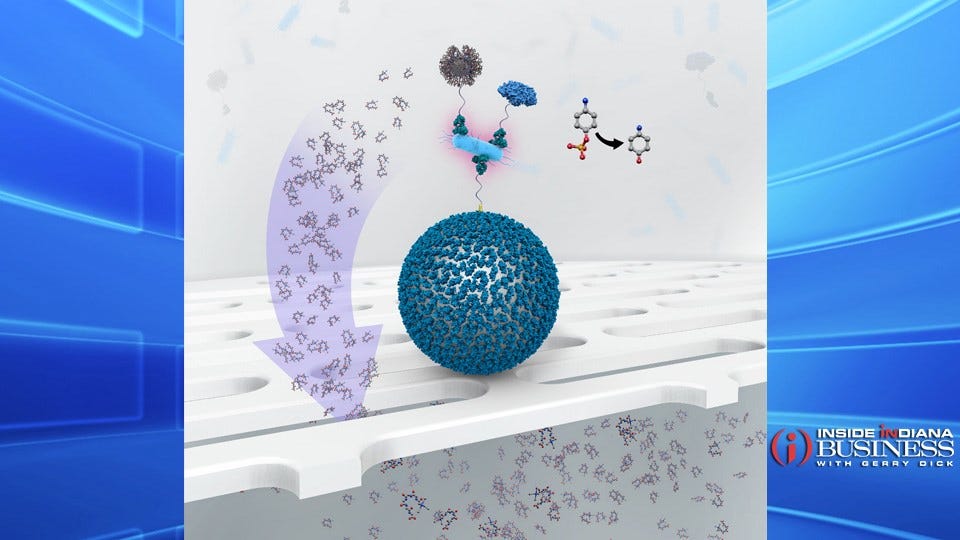IBRI Technologies Lead to Handheld Analyzing Device
 A rendering shows what happens inside the BioMEMS Analyzer at the "point of care
A rendering shows what happens inside the BioMEMS Analyzer at the "point of care
Subscriber Benefit
As a subscriber you can listen to articles at work, in the car, or while you work out. Subscribe NowThe Indiana Biosciences Research Institute (IBRI) is marking a milestone: the team is licensing its first technology, and as a result, giving birth to a startup based in South Bend. IBRI visionaries believe the discoveries will, ultimately, create a handheld device that can detect biomolecules within a sample. Whether it be at a patient’s bedside, in a farm field or a location yet to be imagined, the device is expected to deliver answers faster than ever before.
The handheld device will combine two technologies: BioMEMs and SIERRA Reagent. The BioMEMs portion is an electronic chip that processes samples inside a small device.
“People often call it ‘lab on a chip.’ It’s a technology that’s been evolving for about 20 years. And SIERRA is a nanoparticle chemistry that’s used to detect biomolecules,” says Dr. Michael Pugia, IBRI’s Bioanalytical Technologies group investigator and director. “The core technology is about taking and removing very small numbers of biomolecules, or cells, from complex samples like blood. It’s similar to removing a needle from a haystack. You isolate these molecules and [put them] into tiny, high-sensitivity detectors.”
IBRI says current technologies require days to deliver results, but the handheld device, called the BioMEMS Analyzer, will take minutes.
“The key difference is it’s about 1,000 times more sensitive than what’s currently out there, and it allows you to detect hundreds of biomolecules at one time,” says Pugia. “That has a huge advantage in understanding what’s really going on in the biology of the disease.”
Pugia says the applications for the BioMEMS Analyzer are endless. Its portability means it could be used in a field for agricultural purposes, in a grocery’s produce department to detect bacteria or in medical clinics.
“It’s not limited to what we measure; it’s a new process for how we measure things,” says Pugia. “But we are focusing on infectious disease and wellness testing right now.”
IBRI has identified the rapid detection of resistant infections as the largest unmet need in the market. A handheld device would mean patients could be treated or isolated immediately.
“Currently, it takes three to 14 days to detect and treat an infection properly; that’s just way too late,” says Pugia. “[We’ve focused on] resistant bacterial infections. We’ve also studied the recent COVID-19 virus, and [the device] has worked pretty well. It’s nice that you can just switch the reagents and go on to the next dangerous thing to worry about. There are a lot of resistant infections out there to worry about, so it’s a timely concept.”
The technology has sparked the creation of BioMEMS Analytics LLC in South Bend, a startup that will take on the first technology IBRI has licensed. Indiana University, Purdue University and the University of Notre Dame collaborated to develop the BioMEMS Analyzer. Pugia notes it’s an example of IBRI living out its mission to bridge academia and industry to commercialize innovations. The institute will soon have a new home to uncover even more new ideas; IBRI is moving to the 16 Tech Innovation District to grow its footprint and provide more space for industry-inspired collaborations.
“[Development of the BioMEMS Analyzer] has been a really keen focus. To have three different universities all working at the same time, across input from at least four different industry players in the field, is pretty rare,” says Pugia. “[Indiana] is a good environment for people to have teams, collaborate and get things done. That’s another thing about Indiana that’s unique; Hoosiers tend to get things done and be very realistic about it.”
Acknowledging that the startup is a fledgling, Pugia says its visionaries will “start small, but think big” as it determines the best path to market for the BioMEMS Analyzer.
“It’s been a long journey to see it evolve, and it’s really exciting to see all these new possibilities that it could be used for,” says Pugia. “The job now is to start applying it to practice, and that’s fun.”
Pugia says, in addition to being more sensitive, the device also provides information “at the point where we need it.”
Pugia explains how the BioMEMS Analyzer’s focus on infectious disease dovetails with diabetes, which is one of IBRI’s key initiatives.
